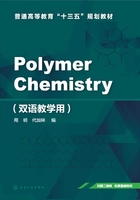
Chapter 1 INTRODUCTION

Polymers(聚合物)are macromolecules(molecular weight ~10000 or greater)built up by linking large numbers of smaller molecules together.Polymers are complex and giant molecules and different from low molecular weight compounds such as common salt sodium chloride(氯化钠).The molecular weight of sodium chloride is only 58.5,while that of polymers can be up to as high as several hundred thousand,even more than thousand thousand.The small molecules that combine with each other to form polymer molecules are termed as monomers(单体),and the reaction that small molecules become polymer molecules is termed as polymerization(聚合反应).This interlinking of many units has given the polymer its name,with poly meaning "many" and mer meaning "part".As an example,a gaseous compounds called ethylene(乙烯),with a molecular weight of 28,combines nearly 5×103 times and gives a polymer known as polyethylene(聚乙烯)(a synthetic plastic)with about 1.4×105molecular weight.
Polymer is defined as a substance composed of thousands of small molecules which have long sequences(序列)of one or more species(种类)of atoms or atom groups linked to each other by primary covalent bonds.Usually,a molecule is considered to be polymer or macromolecular when it only exhibits the typical properties of high molecular weight substances.
Polymer chemistry is a multidisciplinary(多学科的)science that deals with the chemical synthesis and chemical properties of polymers.The challenge in polymer chemistry is the application of fundamental chemical and physical techniques and ideas to large and complex molecules.It is obvious that polymer chemistry,perhaps more than any other research area,is often related to organic,inorganic,physical,and analytical chemistry;physics;engineering;biology;advanced mathematics;electronics and even medicine.A beginner to polymer science needs to be able to blend knowledge together from all these fields.